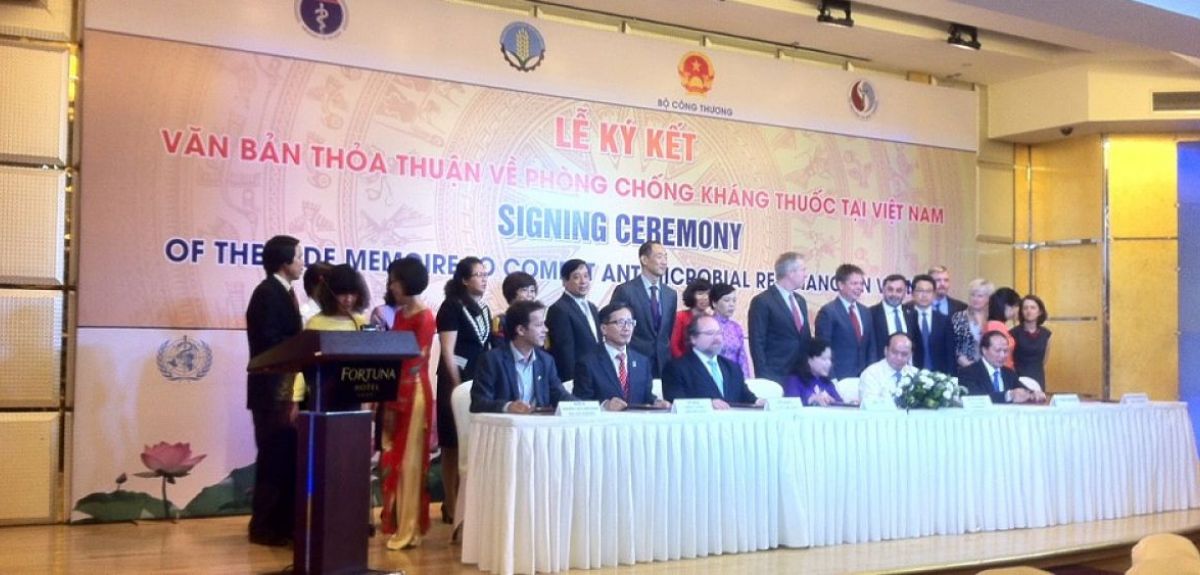
Vietnam AMR aide memoire signing
Tackling the super bug threat in Vietnam
'A post-antibiotic era – in which common infections and minor injuries can kill – far from being an apocalyptic fantasy, is instead a very real possibility for the 21st century.'World Health Organisation Antimicrobial Resistance Global Report on Surveillance 2014
Around the world, governments are taking action to tackle the growing issue of anti-microbial resistance (AMR). In a number of countries, more than half of infections by some bugs are resistant to common treatments.
In Vietnam, the government is committed to confronting the issue. So in a recent ceremony four Vietnamese government departments signed an aide memoire on combating AMR with the World Health Organisation, the UN's Food and Agriculture Organisation. The other signatory was Oxford University, reinforcing the importance of the Vietnam-based Oxford University Clinical Research Unit (OUCRU) to healthcare in the South East Asian nation.
OUCRU, one of the Wellcome Trust’s major overseas programmes, has had key partnerships with the National Hospital for Tropical Diseases in Hanoi since 2006 and the Hospital for Tropical Diseases in Ho Chi Minh City since 1991. Its research covers a range of areas from tuberculosis to dengue fever. Currently, the unit is advising the government of Vietnam on a national action plan to counter anti-microbial resistance (AMR).
Professor Heiman Wertheim is the Director of Oxford University Clinical Research Unit Hanoi. He explains that AMR is a growing issue in Vietnam:
'In the community, 90% of the antibiotics are sold over the counter even though there is a prescription law. Most antibiotics are dispensed for acute respiratory infections, which are mainly viral and do not need antibiotics.
'What we see in the intensive care units of large hospital is that last resort antibiotics like carbapenems or colistin are being used frequently. Compare that to northern Europe, for example, where these drugs are rarely used. The issue in Vietnam is similar to that in other Asian countries like India and China.'
Another issue is the use of antibiotics in agriculture. In poultry and pig productions antimicrobials are typically used to prevent rather than to treat clinical disease. Most commercial animal feed is medicated with antibiotics. The amount of antimicrobials used to raise poultry is in the order of 5 – 7 times higher than in European countries.
Such widespread and indiscriminate use drives bugs to develop resistance, eventually rendering them immune to common treatments. Some countries have already taken steps to reduce the unnecessary use of anti-microbials to stave off this resistance, and Vietnam is set to join them.
So what does the new aide memoire mean for Vietnam?
Professor Wertheim explains: 'The Aide Memoire says that the partners will do everything they can within their means to combat AMR. This is the starting point of getting the funds and expertise needed to combat AMR. Those could be directed to developing surveillance strategies, diagnostics, treatment guidelines, education, awareness campaigns, research, policy development, and so on.'
OUCRU's main role will be supporting decision makers by providing research evidence to shape policy. The unit carries out clinical trials on how to best treat drug resistant infections, which provide important information to policy makers. In agriculture, they conduct studies on how antibiotic use there impacts on AMR and how this could be controlled.
Professor Wertheim adds: 'We work closely with the National Hospital of Tropical Diseases, a leading infectious disease hospital in Vietnam, and with them we plan to set up a national antibiotic resistance reference laboratory and a national AMR surveillance scheme.'
In Vietnam, Oxford researchers focus on four main areas:
- Emergence: looking at how and why antibiotic resistance is developing.
- Prevention: working out how best to prevent resistance developing.
- Alternative treatment options: to find the best treatment options for antimicrobial resistant infections.
- The role of agriculture: to identify of the main drivers of antimicrobial use and resistance in animal production.
Current research includes a study of how resistant infections occur, which looks at patients treated in hospital and those treated in the community. Other researchers are looking at improving the diagnosis of simple infections in primary health care. A further study is looking at pharmacy and prescribing practices to find ways of reducing unnecessary antibiotic use. Apart from AMR in people, researchers are investigating the dynamics of antimicrobial resistance in pig and poultry farms.
Tackling AMR is a big project, with changes required in many areas. The key question is whether it can make a difference. Professor Wertheim believes that it will, but it will take time and a commitment by all partners to work together and coordinate their efforts.
'I am confident that useful policies and interventions will be implemented though it may take a long time to see any effect. The magnitude of how antibiotics are being wasted currently can be changed and this could have a huge impact. If new antibiotics come to the market, we want to ensure these are used with more thought. To do this you need to create behavioural change, besides diagnostics and guidelines. That is a challenge.
'Another challenge is that all the stakeholders need to work together constructively and be complementary. Often you see organizations do similar work but with different methodologies which is a waste of resources. The best way will be to work together and harmonise what we do.'